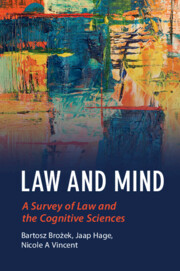Book contents
- Law and Mind
- Law and the Cognitive Sciences
- Law and Mind
- Copyright page
- Contents
- Figures
- Contributors
- Acknowledgements
- 1 Introduction
- I Metatheory and Methodology
- II Ontology and Epistemology
- 6 Cognitive Science and the Nature of Law
- 7 The Architecture of the Legal Mind
- 8 The Psychology of the Trial Judge
- 9 Institutional Design and the Psychology of the Trial Judge
- 10 Bias at the Surface or the Core? A Comment on the Psychology of the Trial Judge
- III Legal Doctrine and Cognitive Sciences
- IV Evidence
- V Dissenting Opinions
- References
7 - The Architecture of the Legal Mind
from II - Ontology and Epistemology
Published online by Cambridge University Press: 21 April 2021
- Law and Mind
- Law and the Cognitive Sciences
- Law and Mind
- Copyright page
- Contents
- Figures
- Contributors
- Acknowledgements
- 1 Introduction
- I Metatheory and Methodology
- II Ontology and Epistemology
- 6 Cognitive Science and the Nature of Law
- 7 The Architecture of the Legal Mind
- 8 The Psychology of the Trial Judge
- 9 Institutional Design and the Psychology of the Trial Judge
- 10 Bias at the Surface or the Core? A Comment on the Psychology of the Trial Judge
- III Legal Doctrine and Cognitive Sciences
- IV Evidence
- V Dissenting Opinions
- References
Summary
This chapter aims at substantiating three claims: (1) that legal thinking consists in the interaction between three mental mechanisms: intuition (unconscious decision making), imagination (mental simulation), and thinking in language (theory-construction); (2) that legal epistemology has largely neglected the role of imagination in legal thinking, while it is imagination that provides ‘the missing link’ between unconscious decision making and thinking in language; and (3) that the picture of the legal mind which embraces intuition, imagination and language provides an explanation of the enduring and seemingly inconsistent threads in legal epistemology. I begin with a general overview of the existing theories in legal epistemology, distinguishing between formalism, dialecticism, coherentism and intuitivism. Along the way, I highlight the fact that these four philosophical stances offer different and sometimes mutually inconsistent perspectives on legal thinking. Subsequently, I analyse the three mechanisms at play in all types of reflection, including legal thinking: intuition, imagination and thinking in language. I try to explain what stands behind these labels, and argue that a lawyer cannot limit themselves to only some of these mechanisms in their cognitive efforts. Moreover, I venture to depict how the mechanisms in question interact in, and what they contribute to, legal decision making. In this context, I put special emphasis on the role of imagination, explaining how it provides a link between intuition and language.
- Type
- Chapter
- Information
- Law and MindA Survey of Law and the Cognitive Sciences, pp. 138 - 164Publisher: Cambridge University PressPrint publication year: 2021

